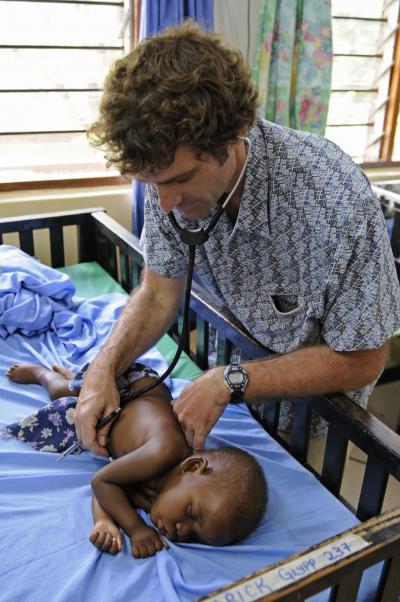Researchers at Michigan State University have identified a test that can determine which children with malaria are likely to develop cerebral malaria, a much more life-threatening form of the disease.
The screening tool could be a game-changer in resource-limited rural health clinics where workers see hundreds of children with malaria each day and must decide which patients can be sent home with oral drugs and which need to be taken to hospitals for more comprehensive care.
"Rural health workers have to make these decisions with very little objective data, and the consequences of an inappropriate decision are huge," said Karl Seydel, MSU assistant professor of osteopathic medical specialties. "Children who progress to cerebral malaria have a 20 percent mortality rate, or even higher if they don't get the right treatment early in the disease process."
In a new study in the Journal of Infectious Diseases, Seydel and colleagues report that testing patients' blood for HRP2 -- a protein produced by the malaria parasite – was an accurate predictor of how the disease progressed among children at Queen Elizabeth Central Hospital in Blantyre, Malawi.
"We found that if HRP2 levels are low, clinicians can be more than 98 percent sure the child will not progress to cerebral malaria," Seydel said. "That would give them the confidence to merely prescribe oral drugs and send the child home."

Karl Seydel, MSU assistant professor of osteopathic medical specialties, cares for a child with malaria in Blantyre, Malawi. Seydel and colleagues discovered a test that can help clinicians make crucial decisions about which malaria patients face the greatest risk for developing a life-threatening form of the disease.
(Photo Credit: Photo by Jim Peck.)
Nowhere is the need for such a tool greater than in Africa, where 90 percent of childhood malaria deaths occur. Only about 1 percent of children with malaria develop the life-threatening form of the disease, yet an estimated 1 million African children die from it each year.
"In most of Africa, where resources are still so limited, using those available resources appropriately and intelligently is of great importance," Seydel said.
The HRP2 test in its current form is costly and poorly suited to use in rural clinics, Seydel noted. He and colleagues are in the process of developing a less expensive, more portable version.
Seydel's collaborators on the study include MSU researchers Lindsay Fox, Terrie Taylor and Mathew Reeves, along with partners from the University of Malawi College of Medicine.
Source: Michigan State University